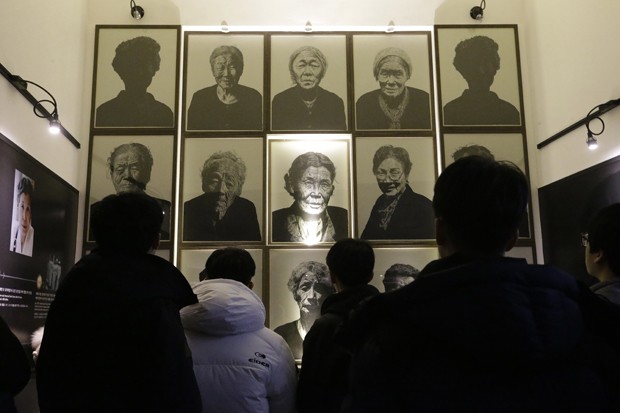Chinese media slam Japan-S Korea deal on wartime sex slaves

South Korea high school students look at portraits of late former “sex salves” who were forced to serve for the Japanese Army during World War II at the House of Sharing, the home for the living sex slaves, in Gwangju, South Korea, Tuesday, Dec. 29, 2015. A day after trumpeting an “irreversible” settlement of a decades-long standoff over Korean women forced into sexual slavery by Japan’s WWII military, there’s relief among South Korean and Japanese diplomats, fury among activists and many of the elderly victims and general public indifference in both countries. AP
BEIJING, China — Japan’s landmark apology for its use of Korean sex slaves during World War II is too little too late, Chinese state media said Wednesday, slamming the long-awaited mea culpa as insincere and insufficient.
The deal officially closes Seoul and Tokyo’s long and bitter dispute over the Japanese Imperial Army’s forced recruitment of “comfort women” to work in military brothels in its former colony.
The issue has long vexed the countries’ ally the US, which fears that lingering wartime resentments are driving South Korea closer to China just as it has ramped up its military spending and become increasingly assertive abroad.
While the deal pleased many in Washington, it met with a frosty reception in Beijing, which wields popular anger over Japan’s wartime atrocities in China — including the use of Chinese “comfort women” — as a cudgel against Tokyo.
Article continues after this advertisementThere has also been a mixed response in South Korea, with the media and some of the women themselves taking issue with the terms, particularly Tokyo’s refusal to accept formal legal responsibility.
Article continues after this advertisementFollowing the rapprochement, questions remain about why Japan “singled out” South Korea for an apology, the official news agency Xinhua wrote in a commentary late Tuesday.
Given Japanese Prime Minister Shinzo Abe’s “undeniable history of prevarication and obfuscation and habit for historical revisionism, people have good reason to remain doubtful”, it said.
Abe has publicly questioned claims that the Japanese military systematically compelled women to become sex workers.
In 2012, he put his name to an advertisement in a US newspaper which described the women as well-paid prostitutes.
“Is the agreement a mere expediency or a genuine and sincere expression of regret?” Xinhua wrote.
On the day the deal was sealed, Abe’s wife announced she had again visited Tokyo’s controversial Yasukuni shrine, with Xinhua condemning her move as “at best a misguided, heartless gesture — at worst a flagrant display of hypocrisy and contempt”.
The shrine honors millions of Japan’s war dead, including several executed war criminals.
In an editorial Wednesday, the government-published China Daily said the settlement between Seoul and Tokyo, which includes an $8.3 million payment to a victims fund, was “largely politically driven, rather than being a true reflection of (Japan’s) responsibility”.
It was “not enough to signify Japan is ready to truly own up to its past”, it added.
During the war the Japanese military used and in some cases set up brothels, called “comfort stations”, across the Asia-Pacific, including China, with estimates saying it may have pressed as many as 200,000 women into servitude.
Beijing-based activist Tong Zeng told AFP that the agreement between Seoul and Tokyo was “a really big shock” for China.
“Japan to this day has not given an apology or compensation to comfort women in countries like China and the Philippines,” he said.
As the war’s “biggest victim”, he added, China “needs to continue to strive to compel Japan to apologise as soon as possible.”
“Otherwise, it won’t be good for history or regional peace.”